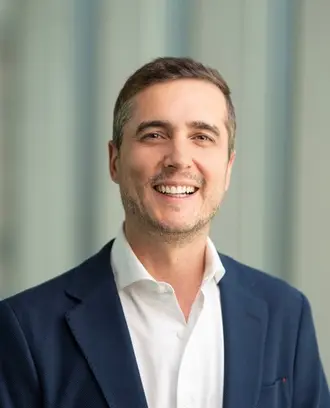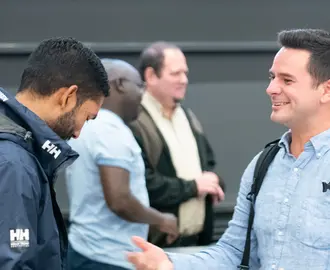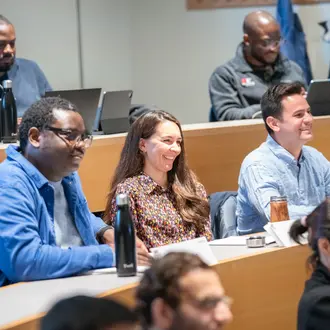With a background in mechanical engineering, Matthew Howard, SFMBA ‘24 has spent the last decade in startups and scale-ups designing and manufacturing 5G infrastructure for the North American telecommunications industry. His professional responsibilities have ranged from engineering design to product management.
Why did you choose the MIT Sloan Fellows MBA?
Matthew Howard, SFMBA '24
I’d been focused on the technical aspects of my career for 12 years and wanted to become a more well-rounded entrepreneur and business leader. I realized that an MBA could guide me in making more informed business decisions. I was interested in the MIT SFMBA program in particular because I wanted to join a cohort with individuals who had an elevated level of wisdom and experience. My research told me that there was incredible value in the SFMBA cohort and wow, that turned out to be true.
Did you have any concerns coming into the program?
Oh, I definitely had doubts and worries. “Crucible of hard work,” that’s the way the program was described, and it intimidated me since I’d been out of the classroom for a while. I also wondered what it would be like to get a degree from an institution with global recognition. I had a classic case of imposter syndrome. And I wondered how my wife and two kids would adapt to my being fully submerged in this program for a year!
Were you able to resolve your concerns?
My anxieties began to fade as soon as I met my classmates, who admitted they felt exactly as I did. I relaxed. We were all in this together. And in spite of my fears, I found I was performing well in the classroom and started getting excited about the year ahead. Best of all, my family settled in. We realized by the fall that things were rolling along smoothly. We looked at one another and said, “Hey, we’re actually fine. We’ve got this!” In the end, I would say we all—classmates and families alike—emerged triumphant.
What goals did you set for yourself at the outset?
I arrived at MIT laser-focused on entrepreneurship, strategy, and leadership. I wanted to build my startup muscles and figure out, for example, how to decide which markets to target for launching a product. I had an intuitive sense about strategy but felt my skills were not refined or trained. I was also interested in investigating smart city technology or, more broadly, finding technological solutions to urban challenges.
My New Ventures class gave me a chance to realize these goals. Our team created an energy business focused on real-time monitoring for the utility grid. We built a mock business and learned so much in the process. We decided not to commercialize the idea for a number of reasons—principally because another company was years ahead of us in that space. But we were actually thrilled to discover that we had competition because it validated our idea. I think I can read small businesses better now. I can detect when the founders have a clear strategy—or don’t. I didn’t have that strategy detector in the past.
You said your third goal was to study leadership?
I had always worked on self-reflection, but this program really encourages you to do more of it. One of my favorite classes was Leading in Ambiguity: Steering Through Strategic Inflection Points where we heard from real leaders of real organizations who discussed the near-death experiences of their companies. I admired the courage and vision of these leaders and was grateful for their willingness to share their stories. I learned that there is no one roadmap for success and how important it is to draw inspiration from your own convictions when you are living in ambiguous times. “Inventing the future”—it’s in MIT’s DNA, and it’s in mine.
What was the relationship like among the cohort?
One of the things I cherish about MIT is that no one graduates with honors--the whole idea is collaboration over competition. What’s important is finding solutions to the hard problems in the world. Your classmates are not your competitors in the SFMBA, they are your partners. Once you realize that, you can draw strength and wisdom from them. When I had questions about financial management or AI, I went to classmates with expertise in those areas. That’s what’s so incredible about this program: the diversity in every sense of the term—backgrounds, ethnicities, capabilities. Over my time in the program, I came to trust in that diversity instead of being intimated by it.
What is your feeling about the immersive one-year experience?
Once again, it’s all about the strength of the cohort. My sense is that you can go a lot deeper on a personal level with a one-year full-time experience. Over the last three weeks of the program, we couldn’t imagine being apart because we’d formed such close bonds as a group. Investing in those friendships was important to me, and I don’t think I could have accomplished that by parachuting in and out of a program.
The Sloan Fellows MBA is special, and you have to have the courage and determination to spend one full year in Cambridge to leverage all it has to offer. We’ve all given up things in our lives to be here, and because of that shared commitment we understand and are invested in one another. I knew I couldn’t achieve the level of growth I wanted by grabbing a random insight or two and taking it back to work. The whole point of the SFMBA is that we need each other to evolve into effective leaders.
Did you tap into the MIT ecosystem during your year?
Definitely. I tried to organize my schedule to make room for significant experiences outside the classroom—especially the newest tech innovations. I took classes in artificial intelligence and machine learning. I took a field trip to Commonwealth Fusion Systems to see the future of clean, sustainable fusion energy. I also organized a tour of the Quantum Computing Lab at MIT. All I can say is you can’t get all these experiences in many places. It’s unique to MIT. I was able to get a look into the future and see tech that won’t materialize for another 10 years. I was a kid in a candy store!
Can you think of an individual or individuals among your peers or the faculty who has been instrumental in helping you meet your goals for the year?
Gayle Grader, head of the Career Development Office at MIT Sloan, coached me to be able to articulate the kind of job I’m looking for. Gavin Fenn-Smith, my leadership coach, also had a big impact on my SFMBA experience but in a more tactical month-to-month kind of way with check-ins and encouragement. And many professors contributed to the year’s incredible takeaways. Professor Robert Freund, for example, who teaches The Analytics Edge, amazed me in the ways he could take complicated ideas and make them clear and straightforward. He was one of the many professors who taught me how to think.
What would you say is your greatest take-away?
The program instilled a sustainable confidence in me. I tackled the academic rigor and developed a working knowledge of so many domains of management. Basically, my confidence grew in tandem with my knowledge. As a result, I feel comfortable leading in many directions. It’s a confidence rooted in a strong ethical base. There are people who bully their way through the world. I was looking to build my confidence based on a firm, underlying commitment to do the right thing. I’ve never worked at an organization with values as strong as MIT Sloan’s, and I’m proud to be associated with this place. The faculty and administrative leaders continually reference the mission. All the professors refer to it at some point. It’s a place with a powerful values foundation, and it shaped my own value system and changed my life.
Your family really settled in beautifully. Any advice for families of new Fellows?
Prepare for the year by setting realistic expectations. In my case, my brother-in-law did the same program, so we knew it would be an intense experience. We resolved to be very intentional about our year in the SFMBA. We focused on two things: building bonds with the community and immersing ourselves in the depth and breadth of the Boston experience. In the end, I’m glad we made those decisions because the reward was great.



